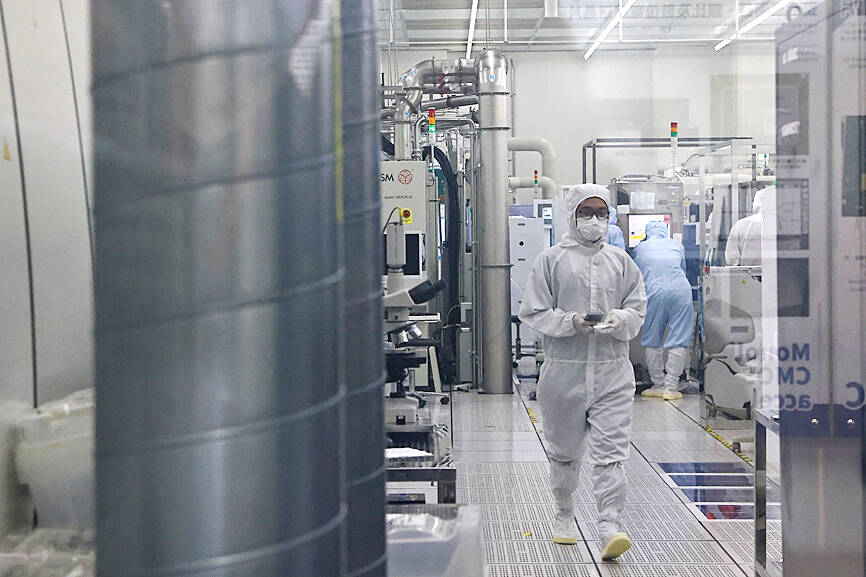Representatives from five high-ranking Taiwanese universities this week toured central and eastern Europe to promote scholarships in semiconductor research aimed at attracting mathematics and physics talent from the region to pursue further studies in Taiwan.
The academic delegation comprised officials from National Taiwan University (NTU), National Cheng Kung University, National Tsing Hua University, National Yang Ming Chiao Tung University and National Sun Yat-sen University.
The tour group visited the Czech Republic, Poland and Lithuania, where they held presentations to inform local students about the Taiwan Semiconductor Scholarship Program, said NTU vice president for international affairs Yuan Hsiao-wei (袁孝維), who was part of the delegation.

Photo: Ann Wang, Reuters
The delegation visited Masaryk University in the Czech Republic on Monday last week and the University of Warsaw in Poland on Wednesday, as well as Lithuania’s Kaunas University of Technology on Thursday and Vilnius University on Friday.
The delegation concluded its tour yesterday at the Slovak University of Technology in Bratislava, Slovakia.
The Soviet influence on central and eastern European countries helped students in the region excel in math and physics, Yuan said from Prague on Wednesday.
The delegation has received positive feedback since its first scholarship presentation in the Czech Republic, she said.
The idea to offer central and eastern European students scholarships for semiconductor research — covering tuition fees, stipends and flight tickets — was proposed by the National Development Council following a delegation’s visit to the Czech Republic in October last year.
Information on the Web site of the Taiwan Semiconductor Scholarship Program shows that master’s students enrolled in the program would each get a tuition subsidy of NT$80,000 per academic year, a monthly stipend of NT$25,000 and a round-trip ticket to Taiwan.
Each master’s student involved in the scholarship program would be sponsored for a maximum of two years, with the tuition subsidy, stipends and airfare amounting to a total of no more than 27,000 euros (US$26,960).
As for doctoral students in the program, in addition to the same tuition stipend and round-trip tickets as master’s students, they would receive a monthly stipend of NT$40,000, according to the Web site. Doctoral students could have the scholarship for up to four years and receive a total of 74,000 euros.
However, the number of scholarships has not been finalized by the Ministry of Foreign Affairs, which finances the program.
Despite interest in the program, European universities have expressed concern that scholarship students might stay and work in Taiwan after graduation, rather than foster semiconductor development in their home countries, Yuan said.
Yuan said that was a possibility, adding that the students could contribute to their home industries if Taiwan invested in the semiconductor industries in those nations.
“The goal of the program is to equip students with adequate know-how about chips and make them internationally competitive,” she said.
The program also marks a new step for Taiwan’s tertiary education sector given that Taiwan’s universities have never had this kind of cooperation with central and eastern Europe before, NTU vice president for academic affairs Stone Ding (丁詩同) said.
The cooperation is a trial, through which each side would get to know the needs of the other and see if there is potential for further cooperation, Ding said.

Intel Corp chief executive officer Lip-Bu Tan (陳立武) is expected to meet with Taiwanese suppliers next month in conjunction with the opening of the Computex Taipei trade show, supply chain sources said on Monday. The visit, the first for Tan to Taiwan since assuming his new post last month, would be aimed at enhancing Intel’s ties with suppliers in Taiwan as he attempts to help turn around the struggling US chipmaker, the sources said. Tan is to hold a banquet to celebrate Intel’s 40-year presence in Taiwan before Computex opens on May 20 and invite dozens of Taiwanese suppliers to exchange views

Application-specific integrated circuit designer Faraday Technology Corp (智原) yesterday said that although revenue this quarter would decline 30 percent from last quarter, it retained its full-year forecast of revenue growth of 100 percent. The company attributed the quarterly drop to a slowdown in customers’ production of chips using Faraday’s advanced packaging technology. The company is still confident about its revenue growth this year, given its strong “design-win” — or the projects it won to help customers design their chips, Faraday president Steve Wang (王國雍) told an online earnings conference. “The design-win this year is better than we expected. We believe we will win

Chizuko Kimura has become the first female sushi chef in the world to win a Michelin star, fulfilling a promise she made to her dying husband to continue his legacy. The 54-year-old Japanese chef regained the Michelin star her late husband, Shunei Kimura, won three years ago for their Sushi Shunei restaurant in Paris. For Shunei Kimura, the star was a dream come true. However, the joy was short-lived. He died from cancer just three months later in June 2022. He was 65. The following year, the restaurant in the heart of Montmartre lost its star rating. Chizuko Kimura insisted that the new star is still down

While China’s leaders use their economic and political might to fight US President Donald Trump’s trade war “to the end,” its army of social media soldiers are embarking on a more humorous campaign online. Trump’s tariff blitz has seen Washington and Beijing impose eye-watering duties on imports from the other, fanning a standoff between the economic superpowers that has sparked global recession fears and sent markets into a tailspin. Trump says his policy is a response to years of being “ripped off” by other countries and aims to bring manufacturing to the US, forcing companies to employ US workers. However, China’s online warriors